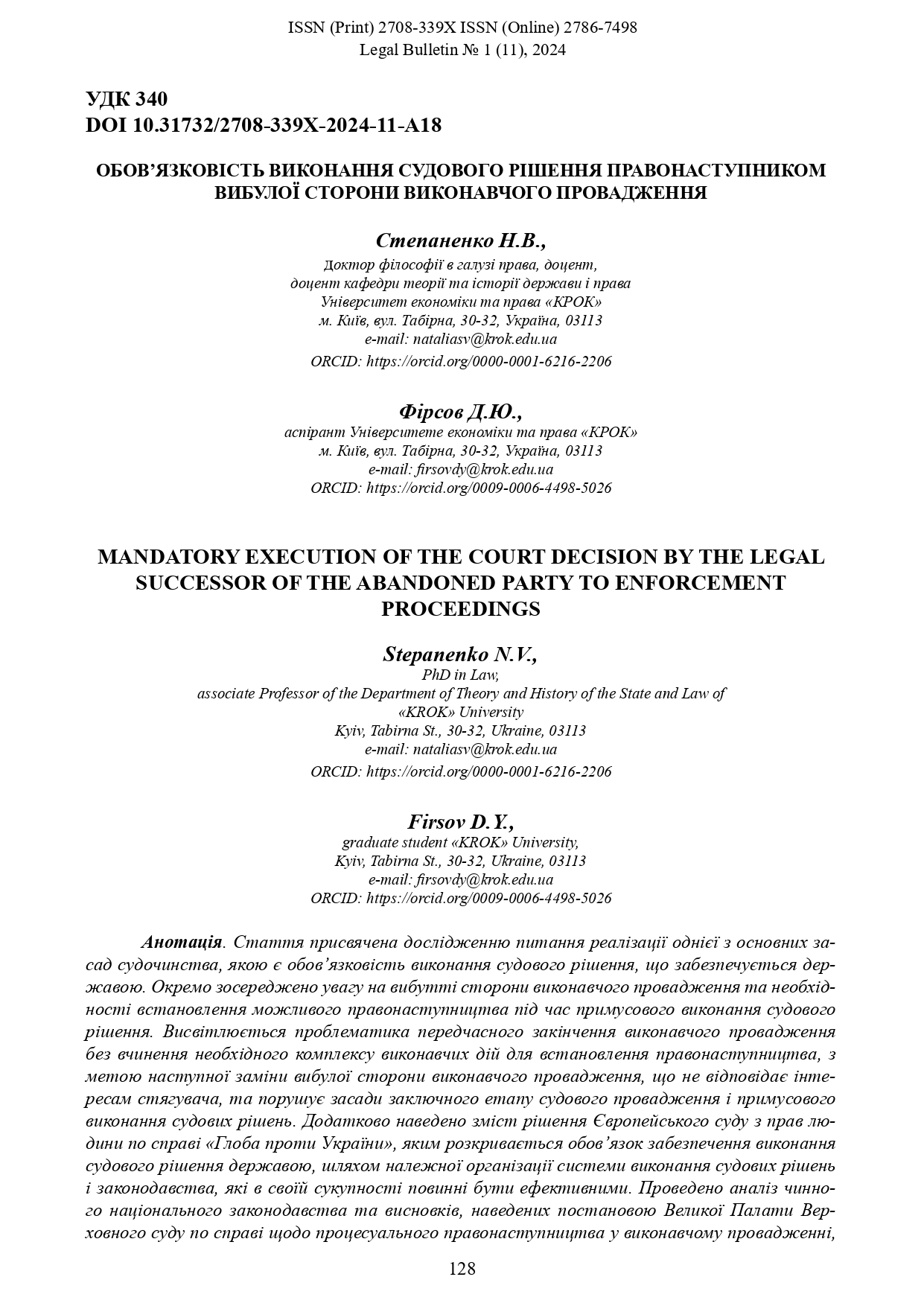MANDATORY EXECUTION OF THE COURT DECISION BY THE LEGAL SUCCESSOR OF THE ABANDONED PARTY TO ENFORCEMENT PROCEEDINGS
DOI:
https://doi.org/10.31732/2708-339X-2024-11-A18Keywords:
court decision, enforcement of decisions, succession, replacement of party, enforcement proceedingsAbstract
The article is dedicated to the exploration of the implementation of one of the fundamental principles of judicial practice, which is the enforceability of court decisions ensured by the state. Specifically, attention is focused on the departure of one party from the enforcement proceedings and the necessity of establishing possible succession during the compulsory enforcement of a court decision. The issue of premature termination of enforcement proceedings without taking necessary executive actions to establish succession, with the aim of subsequent replacement of the departed party in the enforcement proceedings, which does not correspond to the interests of the claimant and violates the principles of the final stage of judicial proceedings and compulsory enforcement of court decisions, is highlighted. Additionally, the content of the decision of the European Court of Human Rights in the case of «Globa v. Ukraine» is provided, which reveals the obligation of the state to ensure the enforcement of court decisions through proper organization of the system of enforcement of court decisions and legislation, which in their entirety should be effective.
An analysis of the current national legislation and the conclusions drawn by the Grand Chamber of the Supreme Court on the issue of procedural succession in enforcement proceedings, which sets a precedent for similar legal relations in judicial practice, is conducted. The authors draw attention to the aggregate of existing risks and negative consequences when ending enforcement proceedings without taking actions aimed at obtaining information regarding the successors of the departing party and subsequent replacement, leading to the violation of the rights of interested parties, opening new judicial proceedings to challenge unlawful actions, and violating the principles of enforcement proceedings, including the enforceability of court decisions. With consideration of the explored issues, a practical proposal for their resolution is provided.
References
Конституція України. (Закон України). No 254к/96-ВР (1996). Вилучено з https://zakon.rada.gov.ua/laws/ show/254%D0%BA/96-%D0%B2%D1%80#Text (дата звернення 29.02.2024 р.)
Цивільний процесуальний кодекс України. (Кодекс України). No 1618-IV (2004). Вилучено з https://zakon.rada. gov.ua/laws/show/1618-15/ed20231231#Text (дата звернення 29.02.2024 р.)
Справа «Глоба проти України» (Заява No 15729/07), Рішення Європейського суду з прав людини (2012). Вилу- чено з https://zakon.rada.gov.ua/laws/show/974_911#Text (дата звернення: 29.02.2024 р.)
Про виконавче провадження. (Закон України). No 1404-VIII (2016) Вилучено з https://zakon.rada.gov.ua/laws/ show/1404-19#n166 (дата звернення 29.02.2024 р.)
Про виконавче провадження. (Закон України). No 1404-VIII (2016) Вилучено з https://zakon.rada.gov.ua/laws/ show/1404-19#n166 (дата звернення: 29.02.2024 р.)
Велика Палата Верховного Суду, 11 жовтня 2023, 523/2357/20 (Україна). Вилучено з https://reyestr.court.gov.ua/ Review/114757808 (дата звернення: 29.02.2024 р.)
Проект Закону про внесення змін до деяких законодавчих актів України щодо примусового виконання судових рішень і рішень інших органів. (Законотворчість). (2020).Вилучено з https://itd.rada.gov.ua/billInfo/Bills/Card/2700 (дата звернення: 29.02.2024 р.)

Downloads
Published
How to Cite
Issue
Section
License
Copyright (c) 2024 Степаненко Н.В., Фірсов Д.Ю.

This work is licensed under a Creative Commons Attribution 4.0 International License.




